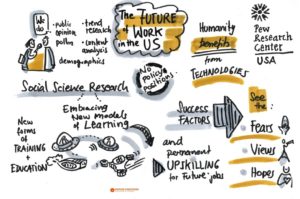The Future of Work in the United States
Pew Research Center is a nonpartisan fact tank that informs the public about the issues, attitudes and trends shaping the world. The Center conducts public opinion polling, demographic research, content analysis and other data-driven social-science research. The Center does not take policy positions.
In the two hours of the virtual world tour, the Center’s Lee Rainie, director of internet and technology research, will offer a variety of presentations, interviews and videos that explore public attitudes and expert opinion, primarily in the United States, on various aspects of the future of work, including automation, robots and the use of algorithms – and the challenges societies face in preparing for that future.
Session host and moderation:
Lee Rainie, Pew Research Center (Director Internet and Technology Research)
Format:
Presentations, interviews, videos including a journey into the future about the following topics:
-
Overview by Lee Rainie of Pew Research Center’s main research findings about the state of jobs in America and public thinking about the role of automation and robots in workplaces (presentation)
First statement: Americans believe automatization will have a considerable impact on jobs in many fields but feel their own jobs are relatively secure.
-
The Near Future. A Better Place. (video): How technology could shape the future: This video presents a variety of scenarios in which humanity benefits from technologies, i.e. the optimistic side of the issue.
-
The potential benefits and pitfalls of emerging technologies on our personal and professional lives (interview) with Robert Atkinson: He takes the listener through the opportunities that future technologies will offer without ignoring the challenges that humanity may also confront.
Atkinson predicts that the US and China will be far ahead of AI development because of their ability to collect data. GDPR means Europe will lag in this area.
-
The future of work in advanced economies (presentation) by Jacob Poushter, senior researcher at the Pew Research Center. He examines public opinion in nine advanced economies and the U.S. on the future of work. The survey looks specifically at how publics view automation, responsibility for preparing workforces for the future (e.g., governments, employers) and limits on job displacement as a result of technology.
Majorities in most countries see downsides of job automation: greater inequality; difficulty finding work; few new, better-paying jobs; and no improvement in efficiency.
-
Education and job-training (interview) with Amy Zalman. The potential opportunities and challenges for creating social structures that develop the needed workforces of the future.
-
Zalman believes that training and education institutions will embrace new models of learning, especially for workers who are reexamining their job-related skills.
-
“A Day Made of Glass“ (video). This video focuses on the future of glass and connected glass-based products, and how mankind may use and interact with them.
-
Pew Research Center findings on a survey of experts (presentation). An in-depth look at how experts see the future education and training systems for the coming world of work. .
Many experts believe that institutions of learning – both formal and informal – will create new models of learning for workers as they retrain and upskill for future jobs. They have diverse views about what traits humans will need to develop to succeed. Experts have a wide variety of concerns including the loss of human judgement and biases in algorithms.
Key message:
An important success factor for the design of tomorrow’s working world is considering the views, hopes and fears of those who will bear the brunt of inevitable changes ahead.
Speakers / Panelists:
Robert Atkinson, President, Information Technology and Innovation Foundation
Jacob Poushter, Senior Researcher, Pew Research Center
Amy Zalman, Principal, Strategic Narrative Institute
